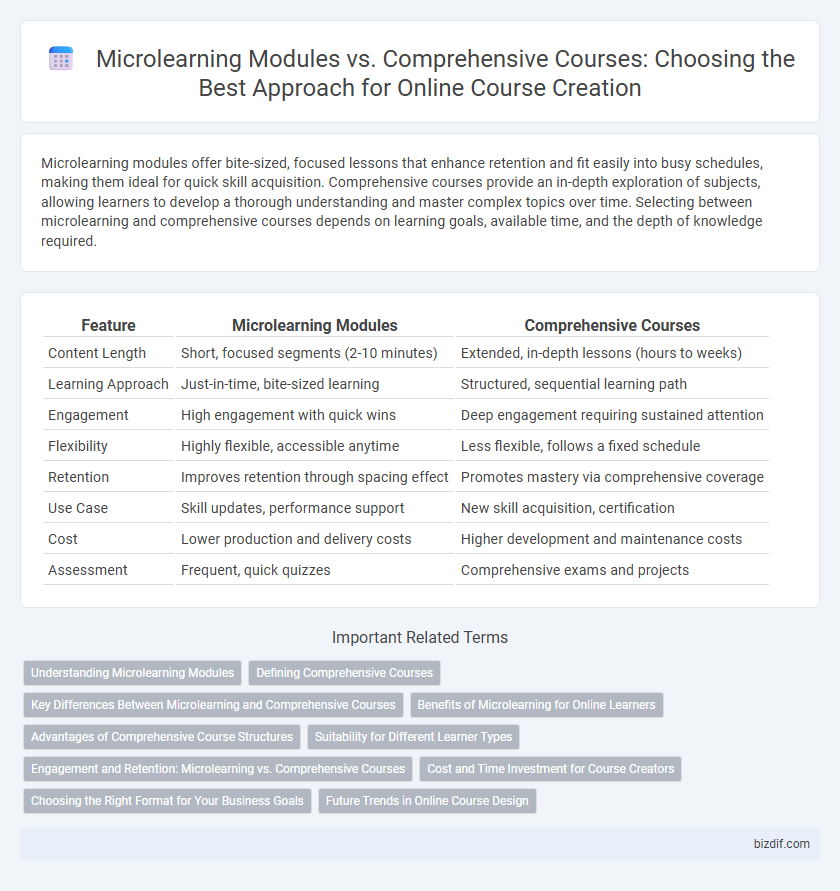Microlearning modules offer bite-sized, focused lessons that enhance retention and fit easily into busy schedules, making them ideal for quick skill acquisition. Comprehensive courses provide an in-depth exploration of subjects, allowing learners to develop a thorough understanding and master complex topics over time. Selecting between microlearning and comprehensive courses depends on learning goals, available time, and the depth of knowledge required.
Table of Comparison
| Feature | Microlearning Modules | Comprehensive Courses |
|---|---|---|
| Content Length | Short, focused segments (2-10 minutes) | Extended, in-depth lessons (hours to weeks) |
| Learning Approach | Just-in-time, bite-sized learning | Structured, sequential learning path |
| Engagement | High engagement with quick wins | Deep engagement requiring sustained attention |
| Flexibility | Highly flexible, accessible anytime | Less flexible, follows a fixed schedule |
| Retention | Improves retention through spacing effect | Promotes mastery via comprehensive coverage |
| Use Case | Skill updates, performance support | New skill acquisition, certification |
| Cost | Lower production and delivery costs | Higher development and maintenance costs |
| Assessment | Frequent, quick quizzes | Comprehensive exams and projects |
Understanding Microlearning Modules
Microlearning modules offer concise, focused learning segments typically lasting 3-7 minutes, designed to improve retention and engagement through targeted content delivery. These modules leverage multimedia elements like videos, quizzes, and infographics to cater to diverse learning styles and facilitate just-in-time learning. Understanding microlearning modules enables educators to create flexible, scalable courses that meet the needs of learners seeking quick, practical knowledge updates.
Defining Comprehensive Courses
Comprehensive courses are extensive online learning programs designed to cover a subject in depth, often spanning several weeks or months. These courses include detailed lessons, assessments, and diverse multimedia content to ensure thorough understanding and skill mastery. They are ideal for learners seeking a complete and structured educational experience.
Key Differences Between Microlearning and Comprehensive Courses
Microlearning modules deliver focused content in short, easily digestible segments tailored for quick skill acquisition and just-in-time learning. Comprehensive courses provide in-depth knowledge with structured, extensive curricula designed for mastery and long-term retention. The key differences lie in content length, learning objectives, and flexibility, with microlearning excelling in accessibility and engagement, while comprehensive courses offer thorough understanding and application.
Benefits of Microlearning for Online Learners
Microlearning modules enhance online learning by delivering concise, focused content that improves retention and engagement through bite-sized lessons. These modules offer flexibility, allowing learners to fit education into busy schedules and instantly apply new skills. The targeted nature of microlearning also supports just-in-time training, reducing cognitive overload and increasing knowledge transfer efficiency.
Advantages of Comprehensive Course Structures
Comprehensive course structures offer in-depth coverage of subjects, facilitating a thorough understanding and mastery of complex topics that microlearning modules may overlook. They provide a cohesive learning experience with structured content progression, enabling learners to build on foundational knowledge systematically. These courses also support diverse learning styles with varied assessments and multimedia resources, enhancing engagement and retention over time.
Suitability for Different Learner Types
Microlearning modules cater effectively to busy professionals and learners seeking quick, focused knowledge bursts, enhancing retention through concise, targeted content. Comprehensive courses suit learners who prefer in-depth understanding, structured pacing, and detailed exploration of complex subjects. Tailoring course formats based on learner preferences improves engagement and knowledge acquisition, maximizing educational outcomes.
Engagement and Retention: Microlearning vs. Comprehensive Courses
Microlearning modules enhance engagement by delivering focused, bite-sized content that fits into learners' busy schedules, promoting higher retention through repetition and spaced learning techniques. Comprehensive courses provide in-depth coverage and structured progression, which benefits learners seeking mastery but may risk lower engagement due to longer sessions. Studies show microlearning increases knowledge retention by up to 80% compared to traditional extended formats, making it ideal for skill reinforcement and just-in-time learning.
Cost and Time Investment for Course Creators
Microlearning modules require significantly lower initial time investment, allowing course creators to design focused content quickly, reducing overall development costs. Comprehensive courses involve extensive research, scripting, and production phases, leading to higher upfront financial and time commitments but offering in-depth subject coverage. Investing in microlearning supports rapid deployment and iterative updates, while comprehensive courses demand more resources but provide a complete educational experience.
Choosing the Right Format for Your Business Goals
Microlearning modules offer concise, targeted content ideal for reinforcing specific skills quickly, enhancing learner engagement and retention in fast-paced environments. Comprehensive courses provide in-depth knowledge and structured learning paths suitable for complex subjects requiring deep understanding and certification. Selecting the right format depends on your business goals: prioritize microlearning for rapid skill acquisition and ongoing training, while comprehensive courses suit foundational learning and detailed professional development.
Future Trends in Online Course Design
Microlearning modules are increasingly favored for their brevity and targeted skill acquisition, aligning with the growing demand for flexible, on-the-go learning experiences. Comprehensive courses continue to evolve through adaptive learning technologies and immersive content, offering deep, personalized educational pathways. Future trends in online course design emphasize hybrid models that integrate microlearning with comprehensive frameworks, maximizing engagement and knowledge retention.
Microlearning modules vs Comprehensive courses Infographic

 bizdif.com
bizdif.com